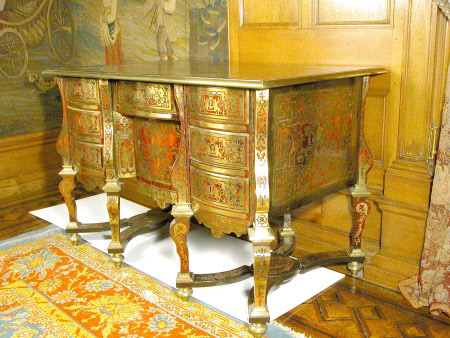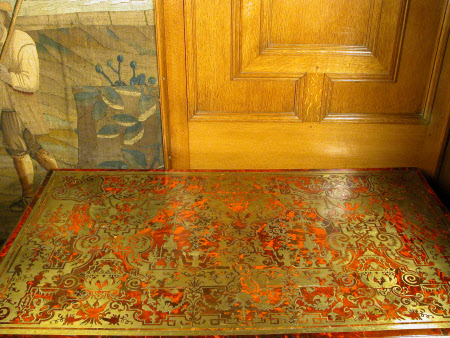Bureau Mazarin
manner of Nicolas Sageot (1666-1731)
Category
Furniture
Date
circa 1710
Materials
Brass, tortoiseshell, ebony stretchers (part), walnut drawers, pine carcass
Measurements
80 x 118 x 70 cm
Place of origin
France
Order this imageCollection
Lanhydrock, Cornwall
NT 882906
Summary
A brass and tortoiseshell bureau-Mazarin, French, circa 1710. In the manner of Nicolas Sageot (1666-1731). The profuse Berainesque theatrical designs in the brass-work including jesters and entertainers, together with moths, monkeys, cherubs, canopied sphinx and birds amongst foliage, the rectangular top with brass edges, the centre section with frieze drawer and hinged compartment flanked by three drawers, standing on eight stiff cabriole legs joined by flattened twin X-stretchers and with toupie feet. See also another similar at Lanhydrock (NT 882802).
Full description
This finely inlaid bureau Mazarin decorated with Berainesque motifs closely relates to a group of boulle bureaux Mazarin either stamped by or attributed to Nicolas Sageot (1666-1731). It is quite typical in form with three drawers flanking a kneehole containing two recessed drawers and standing on eight S-scrolled legs joined by X-form stretchers. A number of Parisian ébénistes made this type of bureau. However, Nicolas Sageot had a particular talent for them and he was inspired by the engravings of Jean Berain which were widely disseminated. Compare for example, a bureau Mazarin stamped by Sageot, illustrated by Jean Néré Ronfort, André Charles Boulle,1642-1732, Un nouveau style pour l'Europe, Paris, 2009, p.170, fig. 5 and pp. 294-295, fig. 45. There is a related bureau Mazarin attributed to Sageot in the Hermitage Museum, St. Petersburg (formerly in the Roudanovski collection) also illustrated by Ronfort, which is identical to another example stamped Sageot in the Royal Swedish Collection. In the National Trust collections there are similar bureaux Mazarin at Berrington Hall, Herefordshire (NT 617661), Treasurer's House, York (NT 592899), Petworth House, Sussex (NT 485368) and Felbrigg Hall, Norfolk (NT 1398377). Nicolas Sageot (1666-1731), received Master 1706: He was born in Samaize-les Bains and appears to have become active around 1690 and is first recorded as working in Grande rue du Faubourg-Saint-Antoine in 1698 where, before being accepted by the cabinet-makers guild, he had worked as an ouvrier libre. He married, in 1711, Marie Brigitte Roussel, the daughter of the ébéniste Jacques Roussel and his workshop prospered until around 1720, when he stopped working and sold his stock. His production seems to have principally consisted of armoires, commodes and bureaux. Jean Bérain (1637-1711): The influence of Jean Bérain is seen here in the whimsical and fluid designs inlaid over most of this bureau. Bérain's work is legendary and he was one of the pivotal figures in the creation of the Louis XIV style. There is a lightness of touch and attention to minute detail in his work which may come from the very start of his career when he produced designs for the metal components on small firearms and locks. His printed designs have a theatricality which is perhaps derived from when he was appointed in 1674 Architecte Dessinateur de la Chambre et du Cabinet du Roi when he produced designs for festivals, ballets and other festive occasions. Bérain's work was widely disseminated and on the year of his death in 1711, a collection of his engraved designs was published in Paris, Oeuvre de Jean Bérain, Recueillies par les Soins du Sieur Thuret. Apart from set design and engraved metal work, his influence can be seen in architecture, works of art, ceramics and tapestries from the Beauvais manufactory.
Provenance
Acquired on transfer of the house to the National Trust. This bureau-Mazarin was mentioned in a 1969 leaflet for visitors to Lanhydrock. There were two, one in the Morning Room and one in the Drawing Room, and were given to the National Trust with the house. Shown in the Drawing Room in a photograph looking from the Morning Room to the Long Gallery taken by John Bethell for the National Trust in 1973. Included in an article in Country Life entitled 'Victorian Lanhydrock II' by John Cornforth, 23 February 1978.
Makers and roles
manner of Nicolas Sageot (1666-1731), maker
References
Cornforth, 1978: John Cornforth. “Victorian Lanhydrock.” Country Life 23 Feb. 1978: pp.458-61. Ronfort 2009: Jean Nérée Ronfort (ed.), André Charles Boulle, 1642-1732 : Un nouveau style pour l’Europe (ex. cat.), Frankfurt 2009, Fig.5 & Fig 45

